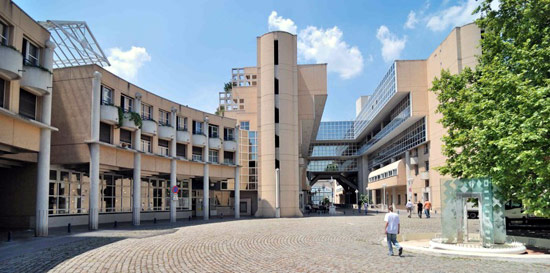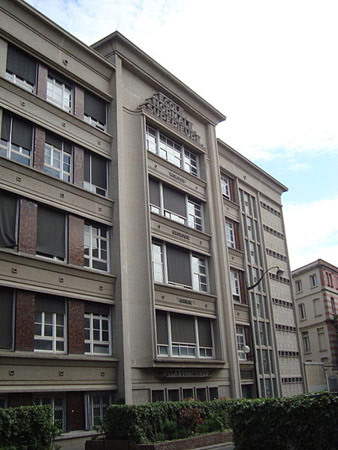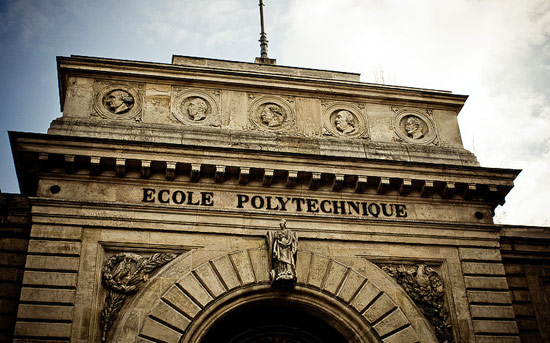Education: Higher Education
France's system of higher education is a dual model, with research and technical universities open to large numbers of students, and grandes écoles with highly selective admission policies. Lycées offer non-university higher education courses that lead to the Brevet de Technicien supérieur (advanced vocational diploma).
French public universities are obliged to accept all candidates of the same region who hold a baccalauréat, but the grandes écoles base their admissions largely upon competitive exams written by preparatory school students. While the grandes écoles have low admission rates, they have produced many of France's political, executive, and intellectual elites.
In 1970, following the fall of the Fourth Republic, the University of Paris (also known as the Sorbonne), which had been the world's second oldest academic institution, was split into 13 autonomous universities. Many of them remain among the country's top universities, a short list of which can be seen below.
| School | Location (Main Campus) |
| École Normale Supérieure de Lyon | Lyon |
|---|---|
| École Normale Supérieure | Paris |
| École Polytechnique | Paris |
| Sorbonne University | Paris |
| Université Paris Descartes | Paris |
| Paris-Sud 11 University | Orsay |
| University of Strasbourg | Strasbourg |
École Normale Supérieure de Lyon
15 Parvis René Descartes
BP 7000
69342 Lyon CEDEX 07, France
Tel: [33] 0 4 37 37 60 00
Web: www.ens-lyon.eu
With roots in two separate schools founded in the 1880s that were later reorganized, moved, and separated, this school took its current name in 2010. The institution has a strong focus on scientific subjects, with 23 research laboratories and 11 technological facilities, including a 1 GHz spectrometer, paleogenetic facility, digital and modeling study center, and geography imaging and information systems facility.
École Normale Supérieure Paris
45 rue d'Ulm
F-75230 Paris CEDEX 05, France
Tel: [33] 0 1 44 32 30 00
Web: www.ens.fr
Founded in 1794 shortly after the French Revolution, this school has advanced undergraduate and graduate studies, and is also a prestigious research university. Its 14 teaching and research departments span a variety of disciplines. Its research-based training includes individual tutorials and personalized attention for the full four years of study. The institution has been rated number 41 in the world by the QA World University Rankings.
Institut Polytechnique de Paris
Route de Saclay
91128 Palaiseau CEDEX, France
Tel: [33] 1 69 33 33 33
Web: www.polytechnique.edu
Founded in 1794, Institut Polytechnique de Paris brought together five top French engineering schools: École Polytechnique, ENSTA Paris, ENSAE Paris, Télécom Paris and Télécom SudParis, with the aim of creating a world-class public higher education and research institution. It offers 19 master's disciplines and 11 teaching and research departments. It offers a wide range of modern courses resulting in bachelor's, master's and doctoral degrees in areas of study including biology, chemistry, mechanics, computer science, languages and cultures, humanities and social science, and physics, among others.
Sorbonne University
15-21 Rue de l'École de Médecine
75006 Paris, France
Tel: [33] 1 44 27 44 27
Web: www.sorbonne-universite.fr
Sorbonne University is a multidisciplinary, research-intensive, world-class university located in the heart of Paris. Among the university's major areas of study are science and engineering, medicine, and arts and humanities. The institution also has three branches in the Île-de-France region: in the Hauts-de-Seine, the communication and journalism school at Celsa; in the Val-de-Marne, the Institute for Logevity–Charles Foix; and in the Yvelines the experimental engineering platform on the Saint-Cyr-l'École campus.
Université Paris Descartes (Paris Descartes University)
12 Rue De L'école De Médecine
75270 Paris CEDEX 06, France
Tel: [33] (1) 76531616
Web:www-ex.parisdescartes
Paris Descartes University has a strong focus on medical and human sciences (medicine, dental surgery, pharmacy, psychology, and biomedicine), social sciences and humanities (sociology, anthropology, linguistics, demographics, and education), mathematics, law, technology (computers, communication, statistics, business management, and marketing), and sport. It was established in 1971 following the division of the University of Paris.
Université Paris-Sud 11 (Paris-Sud 11 University)
339 Rue du Doyen André Guinier
91440 Bures-sur-Yvette, France
Tel: [33] 1 69 15 67 50
Web: www.universite-paris-saclay
The university Université Paris-Sud 11 hosts a variety of physics laboratories, including those that specialize in astrophysics, atomic and molecular physics, condensed matter physics, electronics, nanoscience and nanotechnology, nuclear physics, particle physics, and theoretical physics. There are also a wide range of biology and chemistry laboratories, engineering and technology schools, and 19 doctoral schools.
Université de Strasbourg (University of Strasbourg)
22 Rue René Descartes
F-67084 Strasbourg CEDEX, France
Tel: [33] 03 68 85 65 25
Web: www.unistra.fr
Split apart in the 1970s and reconstituted in 2009, this research university emerged from a German gymnasium founded in the 16th century. The university has one of the largest enrollments in France. The university has 37 departments of studies that cover five major academic fields: arts, literature and languages; law, economics, management and political science; humanities and social sciences; science and technologies, and health.
Copyright © 1993—2025 World Trade Press. All rights reserved.

 France
France 

